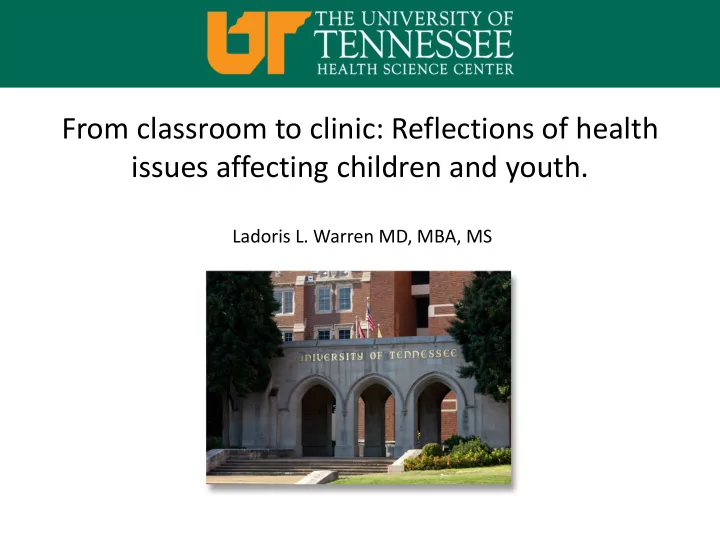

From classroom to clinic: Reflections of health issues affecting children and youth. Ladoris L. Warren MD, MBA, MS
Identifying Patterns, Problems, and Practices Associated with Adverse Childhood Experiences. • Identify patterns that arise due to adverse childhood experiences (ACEs). • Discuss problems with the developing brain. • Discuss practices to promote resiliency.
Classroom Case 16-year-old male enrolled in the 9 th grade while attending his 5 th hour physical science class has an argument with a classmate, threatened to harm the classmate and turns over his seat. When the teacher intervened, the student threatened the teacher.
SAMHSA, 2015
SAMHSA, 2015
ADVERSE CHILDHOOD EXPERIENCES (ACES) https://www.youtube.com/watch?v=XHgLYI9KZ-A Source: Centers for Disease Control and Prevention Credit: Robert Wood Johnson Foundation
Clinic Case 13-year-old female with a past medical history of obesity and a past psychiatric history of depressive disorder, anxiety, attention – deficit hyperactivity disorder, oppositional defiant disorder, presented with right hand pain and swelling for the past three days. Pt had tried taking Tylenol and Motrin without improvement. Therefore after increasing pain, pt went to the emergency department for treatment.
Clinic Case • Substance use – drinking 1-2 12oz cans of beer on the weekend with friends – smoking cannabis daily in the amount of 1-2 blunts, UDS positive for cannabis – smoking 3-4 cigarettes a day for about 4 months.
Psychiatric ROS • Depression: pt endorses sleep problem, loss of interest in activities, problems with concentration • Mania: pt did not display any evidence of distractibility, flight of ideas, grandiosity, pressured or rapid speech, or decreased need for sleep • Anxiety: pt endorses worrying excessively about the new school year, endorses impairs everyday functioning • OCD: pt denies rituals, counting, checking • Psychosis: pt did not appear to be delusional, did not show any evidence of illusions, auditory hallucinations, visual hallucinations • PTSD: pt endorses physical abuse, verbal abuse, and emotional abuse
Mental Status Exam Appearance: 13 yo female who appears as stated age, obese, right wrist appeared swollen and erythematous, sitting up in bed watching tv, wearing hospital gown, fair grooming Behavior: often shakes left leg Attitude: cooperative Speech: normal rate, low volume and speed Mood: “little sad” Affect: mildly dysthymic, anxious Thought process: linear, coherent Thought content: no delusions or destructive thoughts Perceptions: no auditory or visual hallucinations, no overt psychotic symptoms Orientation: alert and orientation to person, place, and situation Intelligence: average Cognition: no deficits Insight: limited Judgement: limited
Social History • Pt lived with mother in community most filled with trailer homes. • Attends local middle school recently completed seventh grade with only minimal passing grades • Pt has only lived with mother • Father and mother were never married • Father currently incarcerated, last contact with father was more than five years ago • Mother’s currently unemployed and normal work was usually retail
Patterns that arise due to adverse childhood experiences • Family History • Mother endorses past psychiatric history of – depression – anxiety – attention – deficit hyperactivity disorder – oppositional defiant disorder • Denies suicide attempts in the past for herself and other family members • Mother reported addiction history of – crack cocaine – heroin – alcohol – cannabis – nicotine – recently finished her third time in rehabilitation treatment which was for 30 days • Maternal uncle and aunt has addiction to varies substances • Pt had spent varies parts of her childhood away from her mother during the times when mother would abuse drugs and times in rehabilitation treatment.
(Asher, 2016)
Problems with the developing brain • Cocaine addicted individuals in general showed significantly – lower HVA, and higher PRL, ACTH and cortisol basal levels respect to controls. • In particular, neuroendocrine changes characterized cocaine addicts with childhood history of neglect and low perception of parental care. • Obsessive – compulsive, depression and aggressiveness symptoms – found related to poor parenting, inversely associated to HVA levels and directly associated to PRL, ACTH and cortisol levels (Gerra, 2009)
Practices to promote resiliency • Treatment for medical illness – Obesity – AKI – Cellulitis • Restarted on psychotropic medication – fluoxetine • Pt’s primary psychiatrist was contacted and notified of care at facility and scheduled follow-up • Encouraged increased sessions with psychologist • Encouraged increased engagement with social organization in the community such as church, school activities, and living community activities • https://www.youtube.com/watch?v=8gm-lNpzU4g
Practices to promote resiliency • Recent enrollment in National Alliance on Mental Illness Family to Family • Recent enrollment in National Alliance on Mental Illness Beginnings • Given list of resources provided by the Memphis Shelby County Community Resources for Mental Health and Tennessee Suicide Prevention Network
References • Asher Ornoy, Victoria Finkel-Pekarsky, Einat Peles, Miriam Adelson ,Shaul Schreiber, Richard Ebstein. (2016). Children of opiate addicted mothers have a high rate of ADHD and increased risk alleles associated with ADHD and with opiate addiction: Study of addicted parents and their children. Reproductive Toxicology. 64 (2016) 22 – 26. • G.Gerra ab C.Leonardi c E.Cortese c A.Zaimovic d G.Dell’Agnello a M.Manfredini e L.Somaini f F.Petracca d V.Caretti g M.A .Raggi h C.Donnini e . (2009).Childhood neglect and parental care perception in cocaine addicts: relation with psychiatric symptoms and biological correlates . Neuroscience and biobehavioral reviews , 3 (4), 601-10. • “Understanding Childhood Trauma.” Samsha.gov, 2015, https://www.samhsa.gov/sites/default/files/programs_campaigns/nctsi/nctsi-infographic.pdf. • Source: Centers for Disease Control and Prevention, Robert Wood Johnson Foundation
Questions
Acknowledgments • My Creator • Family • Program Director • Faculty and Staff • Colleagues
Recommend
More recommend